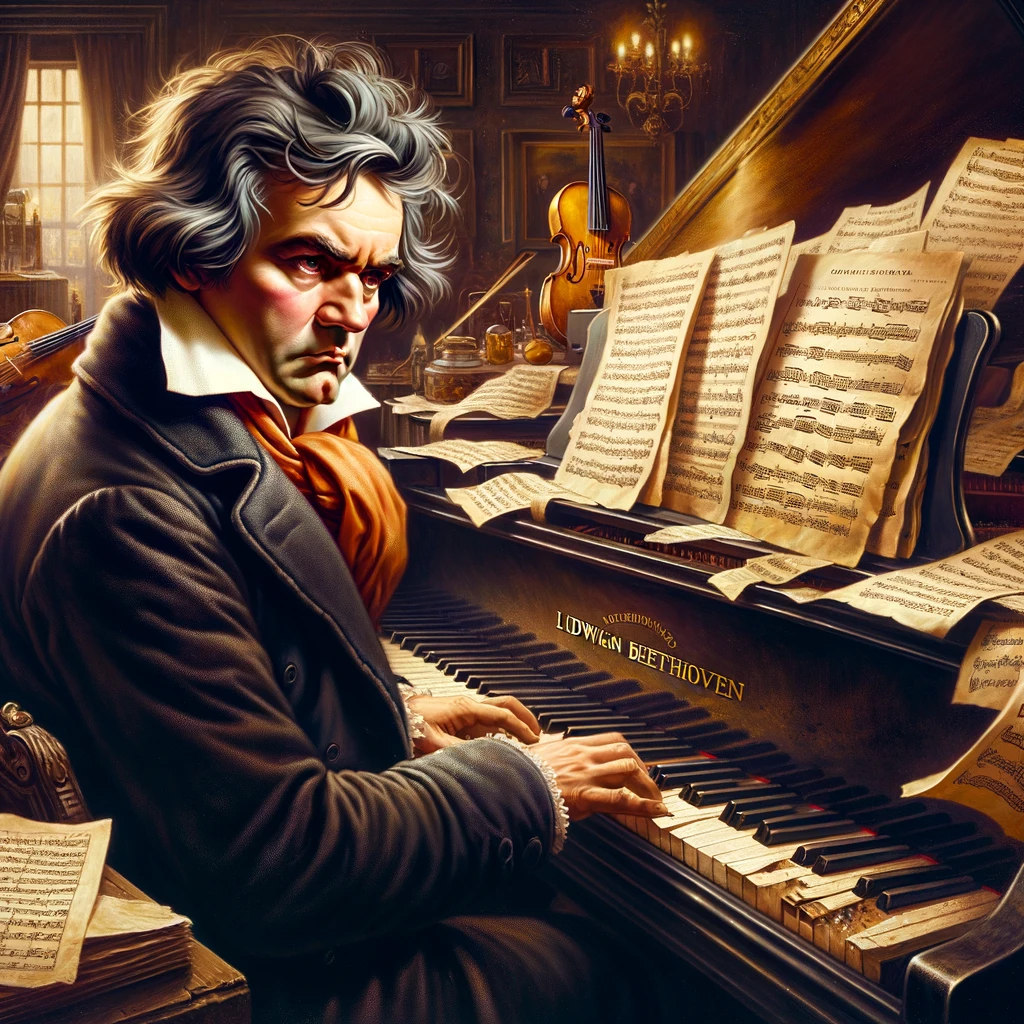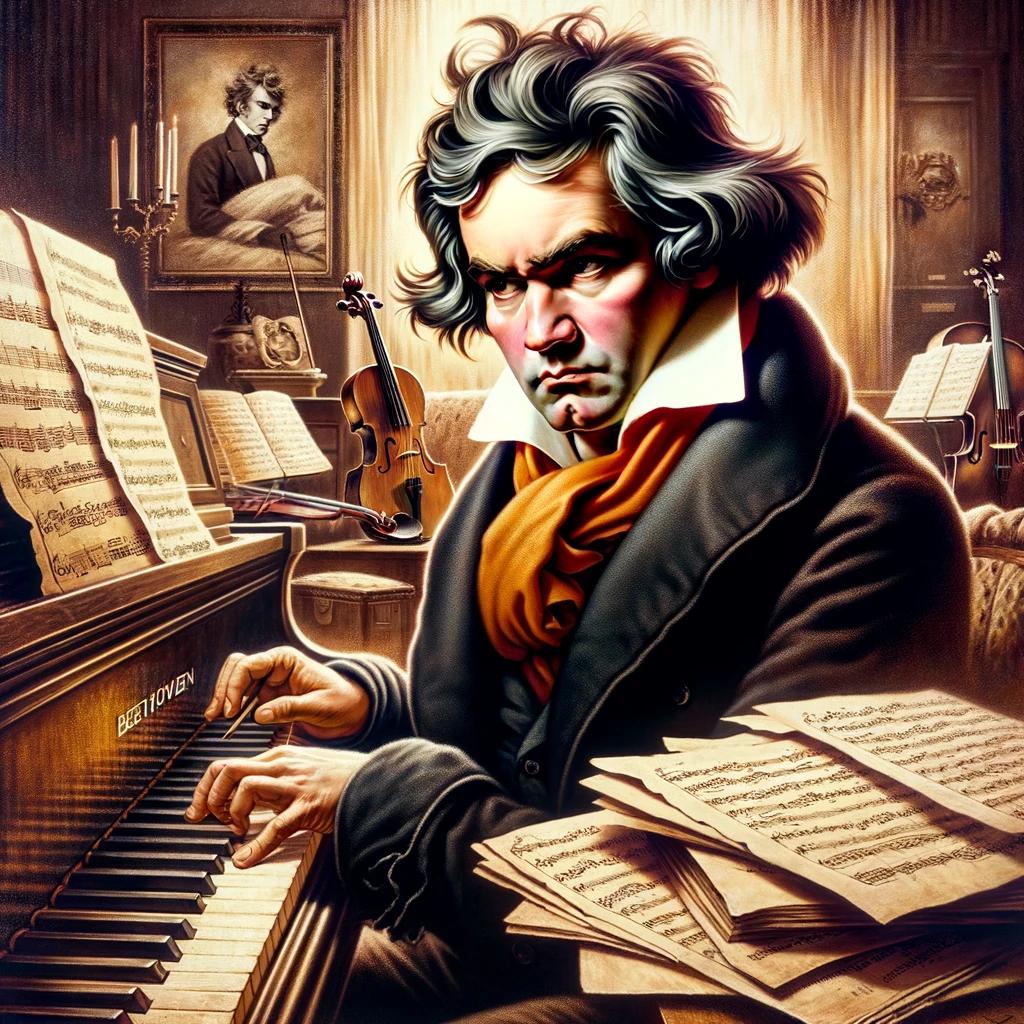Ludwig van Beethoven stands as one of the most influential and celebrated composers in the history of Western music. His compositions, which bridged the Classical and Romantic eras, continue to resonate with audiences worldwide. Despite the immense challenges he faced, including his progressive hearing loss, Beethoven’s genius and perseverance made him a towering figure in the world of music. This article delves into the life, struggles, and enduring legacy of Ludwig van Beethoven, the deaf maestro.
Early Life and Musical Beginnings
Ludwig van Beethoven was born on December 17, 1770, in Bonn, Germany. His family had a musical background, with his grandfather, Ludwig van Beethoven, being a respected musician, and his father, Johann van Beethoven, working as a court singer. Recognizing Ludwig’s musical potential early on, Johann subjected him to rigorous and often harsh training, hoping to mold him into a child prodigy like Mozart.
Beethoven’s first public performance took place when he was just seven years old. His talent was evident, and by the age of twelve, he was already an assistant organist at the court of Bonn. During his teenage years, Beethoven studied with renowned musicians such as Christian Gottlob Neefe, who introduced him to the works of Bach and Mozart, further shaping his musical development.
Move to Vienna and Early Success
In 1792, Beethoven moved to Vienna, the epicenter of the music world at the time. He quickly established himself as a virtuoso pianist and an innovative composer. His early works, including his first two symphonies and piano concertos, were well received, showcasing his ability to blend the structured elegance of the Classical period with hints of the emotional depth that would characterize the Romantic era.
During this period, Beethoven also studied under Joseph Haydn, although their relationship was strained. Despite the challenges, Beethoven’s reputation continued to grow, and he became a sought-after composer and performer in Vienna’s elite circles.
Struggles with Hearing Loss
Around the age of 26, Beethoven began to notice the first signs of hearing loss. This condition, which worsened over time, became a source of immense frustration and despair for the composer. By his early thirties, Beethoven’s hearing had deteriorated significantly, making it difficult for him to perform and conduct.
In 1802, Beethoven wrote the Heiligenstadt Testament, a letter to his brothers in which he expressed his anguish over his deafness and contemplated suicide. However, he resolved to continue living for his art, writing, “I will seize Fate by the throat; it shall not wholly overcome me.”
Musical Evolution and Masterpieces
Despite his hearing loss, Beethoven’s creative output during his middle period, often referred to as his “heroic” phase, was prolific and groundbreaking. He composed some of his most famous works during this time, including the “Eroica” Symphony (Symphony No. 3), which marked a significant departure from the conventions of the Classical symphony, and the “Appassionata” Sonata.
One of Beethoven’s most significant achievements from this period is his Symphony No. 5, with its iconic four-note motif that has become one of the most recognizable themes in classical music. This symphony exemplifies Beethoven’s ability to convey profound emotion and drama through his compositions.
Later Years and Profound Works
As Beethoven’s deafness became more severe, he withdrew from public life, focusing intensely on composition. His later works are characterized by their complexity, emotional depth, and innovative structures. Among these, the Ninth Symphony, completed in 1824, stands out as a monumental achievement. The symphony’s final movement, which includes the choral setting of Friedrich Schiller’s “Ode to Joy,” is a powerful testament to Beethoven’s belief in universal brotherhood and the triumph of the human spirit.
Another significant work from his later years is the Missa Solemnis, a mass that Beethoven considered one of his greatest compositions. The late string quartets, written in the final years of his life, are also remarkable for their introspective and forward-looking qualities, influencing countless composers in the centuries that followed.
Legacy and Influence
Ludwig van Beethoven passed away on March 26, 1827, in Vienna. His funeral was attended by thousands, a testament to the impact he had on the musical world and beyond. Beethoven’s legacy is immense; his compositions have left an indelible mark on the development of Western music.
Beethoven’s ability to transcend his physical limitations and continue to create groundbreaking music has made him an enduring symbol of resilience and artistic integrity. His works are performed and celebrated worldwide, continuing to inspire musicians and listeners alike.
Moreover, Beethoven’s influence extends beyond music. He is often regarded as a pivotal figure in the transition from the Classical to the Romantic era, pushing the boundaries of musical form and expression. His emphasis on individualism and emotional depth paved the way for future composers to explore new realms of creativity.
Ludwig van Beethoven’s life and career were marked by both extraordinary triumphs and profound struggles. Despite his deafness, he created some of the most influential and beloved music in history. Beethoven’s story is one of resilience, innovation, and the unyielding power of the human spirit. His legacy as the deaf maestro continues to inspire and resonate, reminding us of the transformative power of music and the enduring impact of true genius.

Beethoven’s Personal Life and Relationships
While Beethoven’s musical achievements are well-documented, his personal life was complex and often tumultuous. He never married, though he had several significant relationships and infatuations that influenced his work. His “Immortal Beloved” letter, discovered after his death, remains one of the great mysteries of his life, addressed to an unidentified woman who was clearly dear to him.
Beethoven’s relationship with his family was also fraught with difficulties. He had a complicated bond with his brothers, especially after the death of his brother Caspar Carl in 1815. Beethoven became the guardian of his nephew Karl, a role that led to a protracted legal battle with Karl’s mother, Johanna. This period was marked by significant emotional strain for Beethoven, impacting his personal well-being and his music.
Beethoven’s Impact on Future Generations
Beethoven’s influence on subsequent generations of composers is profound. His works have served as a blueprint and inspiration for countless musicians. Composers like Johannes Brahms, Richard Wagner, and Gustav Mahler have all acknowledged Beethoven’s impact on their music. Wagner famously referred to Beethoven as the “musical Christ,” highlighting the almost religious reverence with which his works were regarded.
In the realm of piano music, Beethoven’s sonatas are considered essential repertoire, their technical and expressive demands pushing pianists to new heights. His orchestral works, especially his symphonies, redefined the possibilities of the genre, encouraging composers to explore new emotional and structural depths.
Beethoven in Popular Culture
Beethoven’s legacy extends beyond classical music; he has also permeated popular culture in various forms. His music has been featured in numerous films, television shows, and commercials, making his themes instantly recognizable to even those unfamiliar with classical music. Movies like “Immortal Beloved” and “Copying Beethoven” have dramatized his life, bringing his story to a broader audience.
The “Ode to Joy” from the Ninth Symphony has taken on a life of its own as a symbol of unity and celebration, used in contexts ranging from European Union anthems to New Year’s celebrations around the world.
Beethoven’s Deafness: A Closer Look
One of the most remarkable aspects of Beethoven’s life is his ability to compose despite his deafness. His hearing loss began in his late twenties, and by his mid-forties, he was almost completely deaf. This condition forced him to rely increasingly on his inner sense of sound and his knowledge of music theory.
Beethoven used various methods to cope with his deafness, including ear trumpets and conversation books, which allowed him to communicate with visitors by having them write down their side of the conversation. His determination to continue composing under these circumstances is a testament to his extraordinary resilience and dedication to his art.
The Heiligenstadt Testament: A Turning Point
The Heiligenstadt Testament, written in 1802, is a pivotal document in understanding Beethoven’s state of mind during the early years of his hearing loss. Addressed to his brothers, it reveals his deep despair and his contemplation of suicide. However, the letter also marks a turning point, where Beethoven resolves to persevere for the sake of his art. This resolve is reflected in the heroic and triumphant nature of his compositions from this period.
Innovations in Beethoven’s Music
Beethoven was not just a composer; he was an innovator who expanded the boundaries of musical form and expression. He introduced new structural elements, such as the use of motifs to unify movements in his symphonies, and he explored the emotional potential of music to an unprecedented degree.
One of his most significant innovations was the expansion of the symphonic form. His symphonies, particularly the Third (Eroica), Fifth, and Ninth, are longer and more complex than those of his predecessors. The Ninth Symphony’s inclusion of a choral finale was revolutionary, blending vocal and instrumental music in a new and powerful way.
Beethoven’s Manuscripts and Working Methods
Beethoven’s manuscripts provide a window into his creative process. Unlike some composers who wrote quickly and with little revision, Beethoven was known for his painstaking and meticulous approach to composition. His sketches and drafts show the evolution of his ideas, with numerous changes and corrections.
These manuscripts reveal the depth of his thought and the effort he put into perfecting his works. Beethoven’s working methods underscore his relentless pursuit of musical excellence, reflecting his belief in music’s power to convey profound human emotions and ideas.
Conclusion
Ludwig van Beethoven’s life story is one of extraordinary talent, relentless perseverance, and groundbreaking innovation. Despite facing the immense challenge of deafness, he composed some of the most influential and enduring works in the history of music. His ability to transcend his physical limitations and continue to create masterpieces has made him a symbol of resilience and artistic integrity.
Beethoven’s music continues to inspire and move audiences worldwide, a testament to his genius and the timeless quality of his work. His legacy as the deaf maestro endures, reminding us of the transformative power of music and the unyielding spirit of human creativity.
